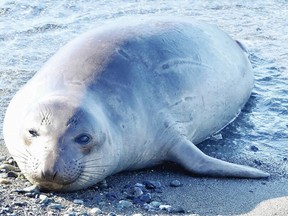“His celebrity is almost a detriment right now,” fisheries officer Morgan Van Kirk said Tuesday. “A lot of people are getting too close trying to take selfies with him.”

Article content
Reports that people are making their dogs and even their children approach Emerson the elephant seal have led officials to consider another relocation of the animal if public behavior does not change.
“His celebrity is almost a detriment right now,” fisheries officer Morgan Van Kirk said Tuesday. “A lot of people are getting too close trying to take selfies with him.”
Advertisement 2
Article content
Article content
The Department of Fisheries and Oceans confirmed on Monday that the two-year-old elephant seal swam about 34 kilometers a day to return to Victoria-area waters just six days after being relocated to an undisclosed beach in the island’s north. from Vancouver on April 5.
Van Kirk said DFO is receiving numerous reports daily about concerning behavior around Emerson, including dog owners trying to introduce the seal to their pets.
One “extremely concerning” report involved a child being encouraged to touch the seal with his nose, Van Kirk said. “Not only is it bigger than a black bear, but it weighs over 500 pounds and is a wild animal.”
Emerson was seen sunbathing in McNeill Bay on Tuesday morning before jumping back into the water.
April and May are the best time for juvenile seals like Emerson to undergo the three- to five-week molting process, during which they lose their hair and the top layer of skin, and then grow their hair back to avoid the cold in the water. During the molting process, seals stop eating and can lose up to 25 percent of their body weight.
The seals spend most of that time dozing and lazily throwing sand on themselves to stay cool, but they are capable of moving quickly and can be dangerous if they feel threatened, the DFO said.
Article content
Advertisement 3
Article content
Canada’s fishing regulations prohibit disturbing marine mammals under any circumstances.
DFO fines can reach $100,000 and are regularly issued for thousands and tens of thousands of dollars, the department said in a statement.
Van Kirk said northern elephant seals can also carry a number of diseases transmissible to humans, including bird flu.
Other possible results of a seal encounter gone wrong include sealant finger, an infection that regularly led to amputations before an effective treatment was found in 1979.
Van Kirk said that so far no fines have been issued to those who disturb Emerson, but DFO is following up on reported complaints. “It’s too early in the process, but we are investigating.”
The department is also partnering with volunteers from the British Columbia Marine Mammal Response Network to educate the public, he said.
Another relocation could be potentially harmful to Emerson because of the amount of power required by the seal, but officers may be forced to act if there are threats to and from the public, Van Kirk said.
A relocation could also occur if Emerson finds its way into traffic again, as happened this month at Gorge and Admirals roads.
Advertisement 4
Article content
“We are taking a different direction. She has made it very clear that she wants to be in Victoria,” Van Kirk said. “We’ll have to consider moving it probably more locally.”
The hope is that Emerson will find another place to move as he matures into a 5,000-pound adult, he said.
DFO’s concern is that Emerson, born in January 2022 in Bowman Bay in Puget Sound to a family of elephant seals known for their urban antics, will habituate to humans.
“That can only end very badly, either for himself or for someone else.” [else] get injured,” Van Kirk said. “We want to keep wild animals wild.
“At the end of the day, your safety and public safety come first.”
Reports of marine mammal harassment can be made by calling 1-800-465-4336 or by email at [email protected].
Recommended by Editorial
-

American killer whale hunter has advice for British Columbia rescuers: Build a good relationship with your killer whale
-

Orcas that hunt the world’s largest predators may be a new population, UBC scientists say
Article content


